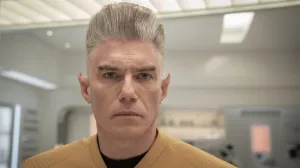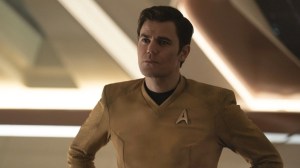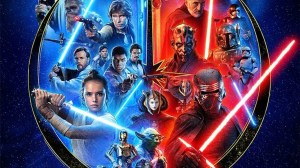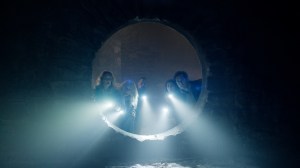On paper, the Enterprise’s mission in Season 3, Episode 7 of Star Trek: Strange New Worlds “What is Starfleet?” is relatively straightforward (as Starfleet missions go): deliver supplies including a colossal, glowing alien creature known as a Jikaru (nicknamed the “space dragon” by the Enterprise crew) to help support the war-ravaged planet Lutani VIII, so far so simple… But as always, nothing in Trek is ever that simple. It soon becomes apparent that the creature has been weaponized by the Lutani, and its very presence amongst their arsenal could tip the balance of war.
Videos by ComicBook.com
Enter Umberto Ortegas “Beto,” Helmsman Erica Ortegas’ irrepressible brother and filmmaker, whose investigation begins to frame Starfleet’s involvement in the Lutani conflict as potentially exploitative. To him, Starfleet represents the military arm of an imperialist state dressed up as aid workers and explorers. The Federation isn’t feeding the hungry or helping the needy, he argues — it’s simply securing the cooperation of yet another planet for its ranks. Told through the lens of a meta in-universe documentary, the episode asks whether Starfleet is a noble force for good… or just part of another galactic empire hiding behind a façade.
But, when you think about it, the question – “What Is Starfleet?” isn’t just the million-dollar question of the episode — it’s the central question Trek has been quietly asking for decades.
A Question as Old as Star Trek Itself
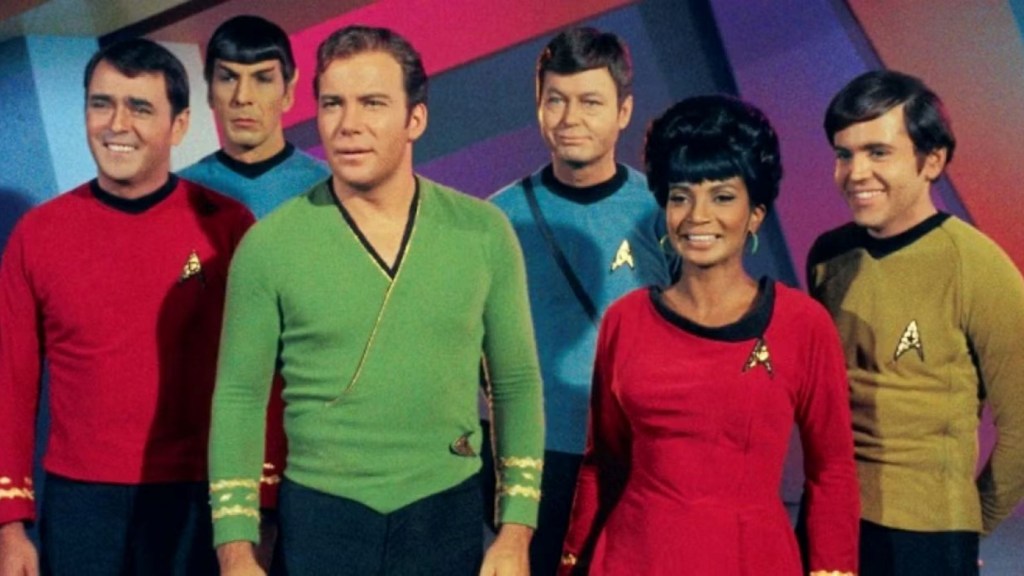
When Star Trek: The Original Series first aired in 1966, born of the space race, the Cold War, and racial politics of the America of the day, Gene Roddenberry intended the show to paint an optimistic view of the future, looking forward to humanity’s potential place amongst the stars. Star Trek presented the United Federation of Planets as something of a utopia: no money, little prejudice, a seemingly benevolent governing body that will actually answer cries of hunger. Despite the oft-memed high mortality rate of redshirts when the Enterprise crew inevitably got themselves into scrapes and their tendency to stick their nose in where it wasn’t wanted (regardless of the Prime Directive), Starfleet officers were clearly explorers and scientists first, soldiers second. Sure, there was obviously a little blind patriotism and a few colonialist ideals mixed in there (the image of Kirk proudly shoving a UFP flag into the dirt of a distant world springs to mind), but, on the whole, decent folk.
Even stretching into the ’80s, Star Trek’s first real spin-off (not counting The Animated Series), The Next Generation, still, for the most part, embodied that idealism, with Picard famously declaring, “The acquisition of wealth is no longer the driving force in our lives. We work to better ourselves.” But, by the time the ’90s rolled around and the general populous had become that much more cynical (and discerning in their viewing?), Deep Space Nine, fittingly, began to experiment with darker themes and chip away at that image of benevolence.
Through its Dominion War storyline and showing other more sinister sides to life in Starfleet and the Federation as a whole, it reminded us how thin the line is between Utopias and Dystopian, uncaring states. The Maquis were, of course, a resistance group of Federation-born colonists and disillusioned Starfleet officers who fought back against the Cardassian occupation of their homes after they were effectively abandoned by the Federation to the Cardassians to negotiate peace, a perfect example of how supposed “peace” might come at a cost, not truly meaning freedom for all.
Voyager complicated things further, stranding its crew far from the Federation and forcing them to weigh survival against principle, with Starfleet and the Federation doing extraordinarily little to attempt to contact or locate their lost comrades. Enterprise delved more into the behind-the-scenes politics and policies of the Federation and Starfleet’s beginnings. The fact that a conflict, the Earth-Romulan War, led to the formation of the Federation isn’t exactly reassuring. To quote The Hunger Games – “War terrible war… then came the peace, hard fought, sorely won,” – well, we all know how that one turned out…
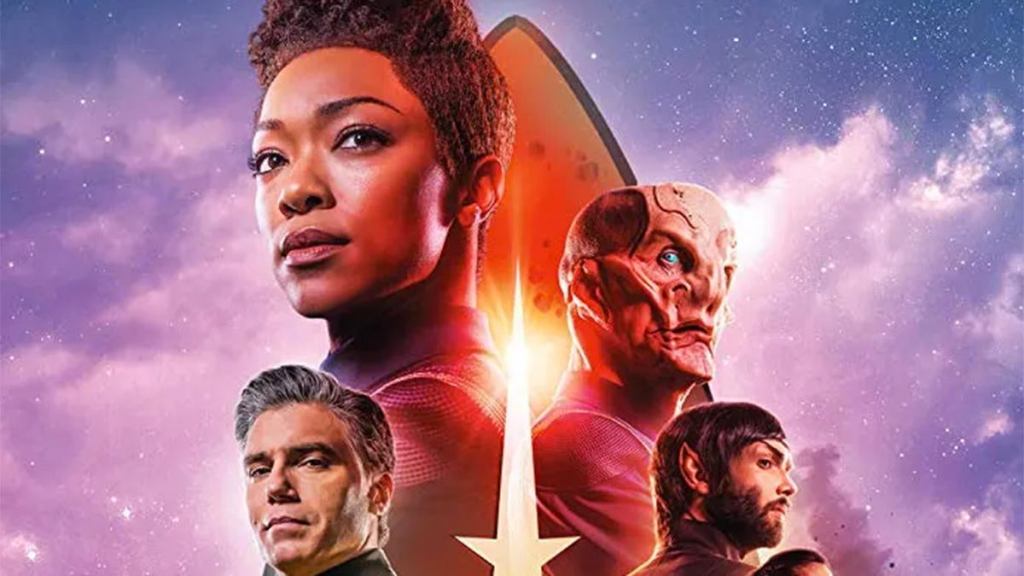
In modern Trek, the shift towards cynicism and darker themes has often caused a divide among fans, with some happily warping into this new angle full throttle and others missing the quiet optimism of the series’ past. Discovery’s first season plunged the Federation into a brutal conflict, exploring the Federation-Klingon War. It’s extremely telling that the hero of the series, Michael Burnham, starts out as a disgraced officer, court-martialled for her actions in defying Starfleet. What does it tell us that of all the supposedly fine, upstanding officers, Burnham, who defied Starfleet, is the one we are supposed to root for? Picard revealed corruption and apathy at the highest levels of Starfleet. Even the JJ Abrams Kelvin timeline films framed Starfleet as dangerously militarized.
It seems that every few years, with each new spin-off and iteration, Star Trek circles back to the same niggling question – what is Starfleet then? What does it really stand for? The difference being, though, that in “What Is Starfleet?” this question isn’t just dangled or asked rhetorically, it’s asked explicitly, to the characters themselves no less.
A Space Dragon & A Larger Metaphor
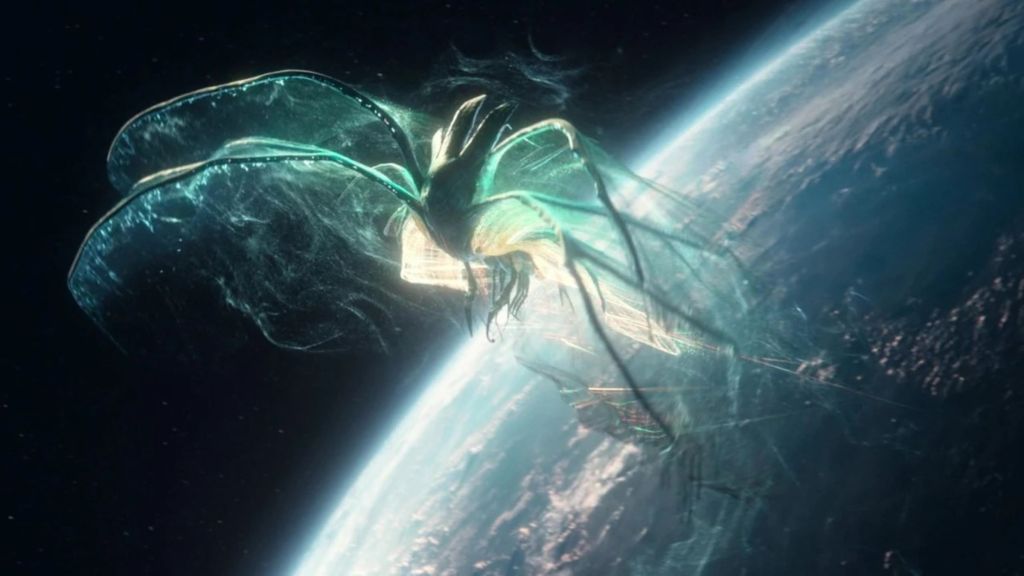
The idea of framing the story through a documentary style lens isn’t entirely new for Trek — Deep Space Nine’s “Inter Arma Enim Silent Leges” and Lower Decks’ “Crisis Point” both experimented with shifting perspectives to challenge Starfleet’s ideals. But “What Is Starfleet?” feels especially pointed. By showing us Pike’s crew spied upon, interrogated, and even deliberately misrepresented by Beto’s ‘lens’ both literal and metaphorical, the show forces both its characters and its audience to wrestle with the question of what actually makes Starfleet different from the empires it opposes.
This (arguably skewed) documentary is really very much a microcosm of the questions and criticism that Trek has faced for decades, both in-universe and in the real world. Episodes from The Next Generation through Discovery have wrestled with these questions, but “What Is Starfleet?” brings it to the forefront in a raw and more personal way. It might just be the ultimate fan service to sit the characters down in front of a camera and get them to share their thoughts on the universe they inhabit!
The choice of storyteller here — Beto, the brother of an esteemed Starfleet Officer — matters almost as much as the story itself. It would be easy to argue that Beto’s cynicism is simply born of and sharpened by personal resentment: after all, Starfleet very nearly got his sister killed when she was captured by the Gorn earlier this same season. Clearly, Beto has a complicated relationship with Starfleet, but he also makes some valid points, voicing what we, the audience, are often thinking. Beto acts as a stand-in for every critic who has ever questioned the Federation’s utopian image. Is it a shining beacon, or just a more benevolent empire? Is Starfleet’s mission exploration or control? Star Trek has asked these questions before — but rarely in a way that comes so close to breaking the fourth wall. Beto serves as a sort of go-between for the characters and us, their silent spectators, encouraging Uhura and others to question the orders they are given.
To Beto, their latest mission is proof of Starfleet’s hypocrisy. But things are complicated further when the Jikaru reveals it wants to die to end its long captivity and exploitation by the Lutani, in their desperation to turn the tide in their war. Pike and his crew defy Starfleet orders and their Lutani allies to honor the Jikaru’s request, assisting it to its final rest by helping it plunge into a nearby star. This action by the crew of the Enterprise brings new perspective to the question of whether Starfleet is a force for good, but in typical Star Trek fashion, it also adds a new moral angle: is Starfleet interfering, depriving the Lutani of a vital weapon, or preserving the dignity of a sentient being? What could have been a story about colonialist themes becomes one about kindness and dignity. For Beto, this complicates his narrative; it’s a surprising contradiction of his beliefs. To the audience, it’s a reminder that Starfleet’s true strength lies in compassion, not conquest – we are not surprised, because it’s quintessential Trek.
Starfleet on Trial

This act of mercy by Pike and his crew shows it’s not just Burnham that is proven to be the best kind of officer because she won’t just blindly follow Starfleet’s orders to the letter. The iconic James T. Kirk himself was also well known for tweaking the odd detail in a report or two to cover up an action he knew wouldn’t be condoned by high command, but which he felt in his heart was right. Even his stoic and logical Vulcan First Officer Spock was known for bending the rules just a little when it was ‘logical.’ In fact, almost every prominent officer we have come to know and love throughout every Star Trek series has shared this quality of questioning authority to some degree. They are all, to some extent, rule breakers and risk takers, but most importantly, all seem to understand the unspoken truth that occasionally, Starfleet Command needs to be given the middle finger!
But then that once again begs the question: if there is a silent understanding that Starfleet Command must be stood up to, that they don’t always get it right, don’t always have their officers’ and allies’ best interests at heart, then what does that make them? What is Starfleet?! Is the Federation a shining utopia, or a colonialist power hiding behind nice, shiny ideals? Uhura ultimately provides the answer: Starfleet is its people. Not the Admiralty, the people at the top who haven’t seen the trenches, so to speak, not the bureaucracy, but the crews who choose kindness and sacrifice over easy power every day. It’s almost a meta statement about Star Trek itself. Fans don’t stay for the special effects, star maps, alien races, or even the space battles; they stay for the people – Pike, Spock, Ortegas, Uhura -the characters who embody those ideals.
Viewers who connect with Beto’s cynicism may feel strongly that Starfleet and The Federation as a whole isn’t perfect, and that’s most likely true, but most fans will also agree that the Enterprise, no matter the crew that helms it, represents the best of Starfleet and the ideal of what the organization could be. That tension — between cynicism and hope — is exactly what makes the episode such a fascinating watch, even if the execution isn’t always smooth.
Pike’s Crew As the Answer
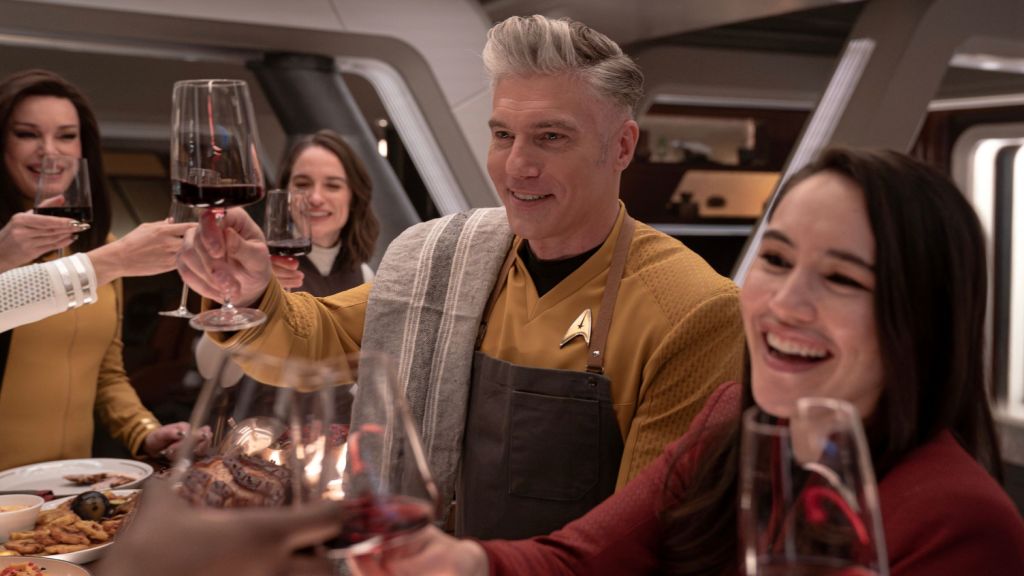
Admittedly, “What is Starfleet?” has its faults. For an episode that directly poses a question, it does take an awfully long time to get to the answer. And for all its declassification labels, space FOIA requests, and Pike and his crew’s murmurings about ‘Starfleet’s orders,’ we still don’t actually get to analyse any of said orders… they’re all still – ‘classified!’ One might argue that if we’re really going to get to the heart of the question, ‘what is Starfleet?’ and we’ve identified a problem at the top of the chain of command, then we could probably do with examining its various policies and dictates in a bit more detail. This is something hardcore Trekkies have been clamouring for for decades, and which writers Kathryn Lyn & Alan B. McElroy arguably missed a prime opportunity to explore.
However, it also might be the case that delving too deeply into Starfleet’s command structure would have defeated the point. It’s no coincidence that the episode’s conclusion is framed not through speeches from admirals, but through the actions of Pike’s crew. La’an, Spock, Chapel, Ortegas, and Uhura — they all embody the idea that Starfleet is what its officers make of it. When Pike honors the Jikaru’s wish to die, it’s a direct answer to Beto’s cynicism. The Federation isn’t perfect, but on the ground (or bridge), its people, its representatives, are defined by compassion – that’s what separates Starfleet from the Empire.
Why “What Is Starfleet?” Matters
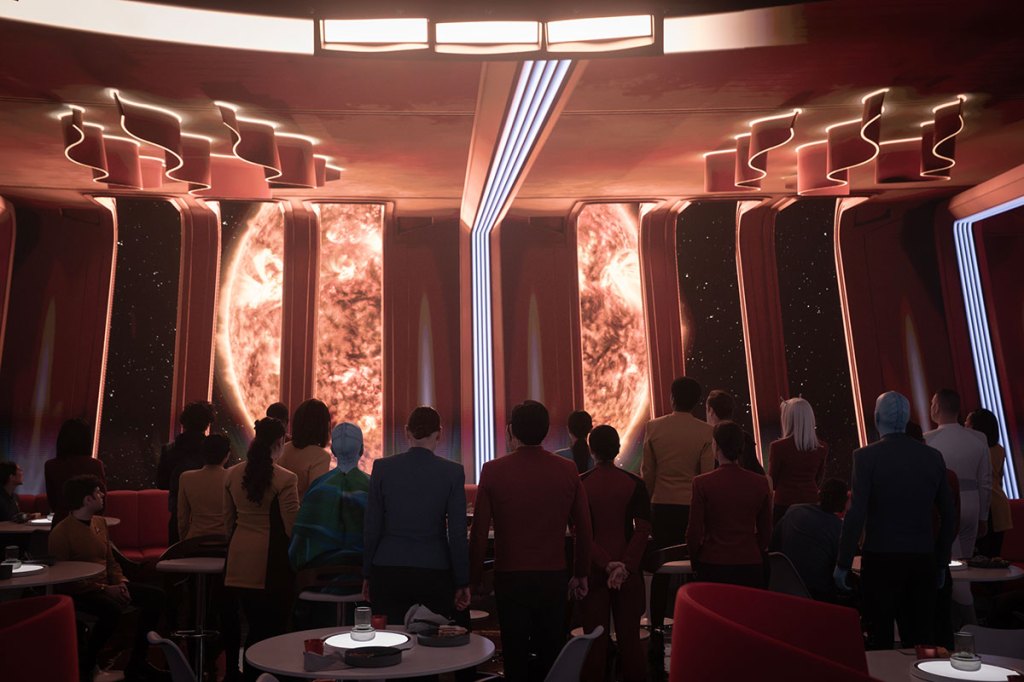
Trek’s optimism isn’t about ignoring Starfleet’s flaws (though it can sometimes feel that way!) It’s about maintaining the belief that good people, working together, can do better. In today’s fiction — where antiheroes and cynicism often dominate — that optimism is as radical as ever.
Perhaps the real question we should be asking is, can Star Trek’s utopian vision still work in a darker, more critical TV landscape?
For all its flaws — uneven pacing, intrusive camerawork, and a seemingly undercooked argument — “What Is Starfleet?” feels like a real mission statement from Strange New Worlds. The series has leaned into genre experiments before, from musicals to courtroom dramas, but this episode explicitly defines its philosophy and stands firm. The message is clear: modern Trek still very much believes in its own optimism.
And that’s important, because in the era of House of the Dragon and Andor, stories of bright futures can feel dated and naïve. Against that backdrop, “What Is Starfleet?” feels like Strange New Worlds is flying a flag for optimism again — insisting that the institution’s heart is still good, because of the people who serve within it. By giving Pike and his crew the final word — not Beto’s cynical cut of the film — Strange New Worlds proves that hope, empathy, and decency remain revolutionary ideas worth defending.
What This Means for Strange New Worlds
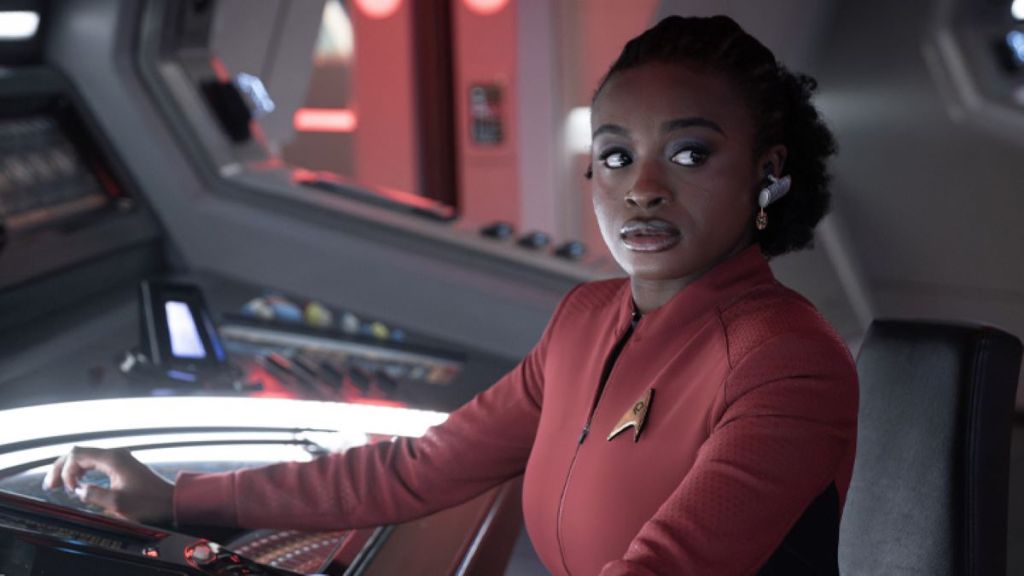
This also poses an interesting question for the rest of the season. If Starfleet is really “the people,” then what happens when those people falter? This certainly sets up some intriguing possibilities. Pike’s crew has already been through some serious trauma this year — Ortegas is still scarred from her injuries and encounter with the Gorn, La’an’s still haunted by loss and heartbreak, Spock’s still torn between two halves, in the midst of an identity crisis as ever… It remains to be seen whether “What Is Starfleet?” will prove to be more of a one-off experiment or the thematic centerpiece of an insightful finale arc, but the season’s conclusion may well test whether these ideals can survive not just institutional failure, but personal ones.
The Boldest Question
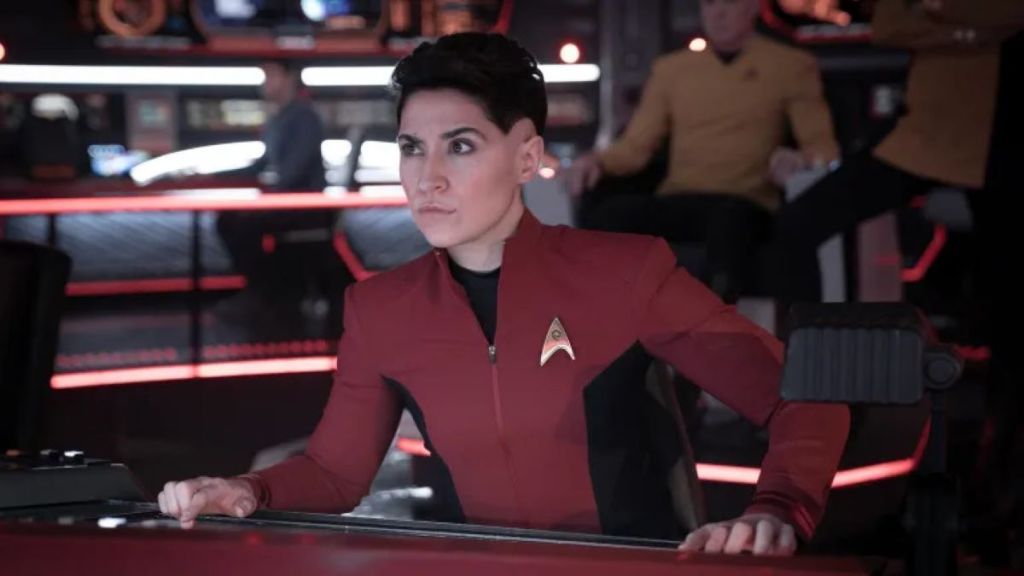
One thing’s clear: in asking the boldest and oldest question in Trek history, Strange New Worlds just reminded us why Star Trek endures. The answer — that Starfleet is the people who choose to live by its ideals — is both timeless and necessary. And in the end, that’s what makes “What Is Starfleet?” one of the most important hours of Strange New Worlds to date.
New episodes of Star Trek: Strange New Worlds Season 3 premiere on Thursdays on Paramount+.

